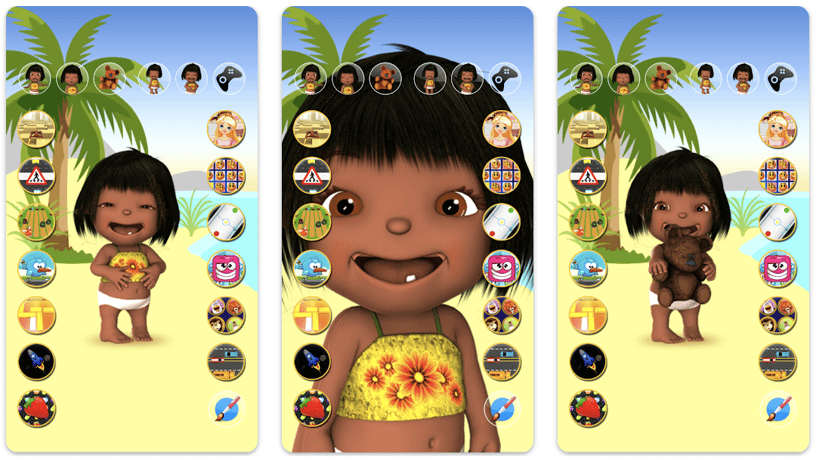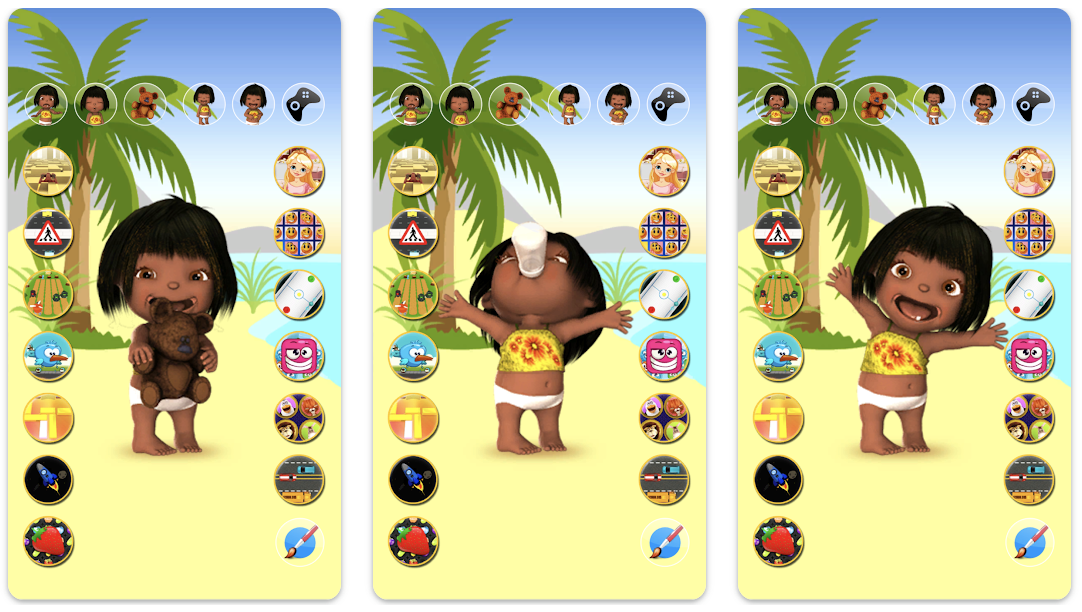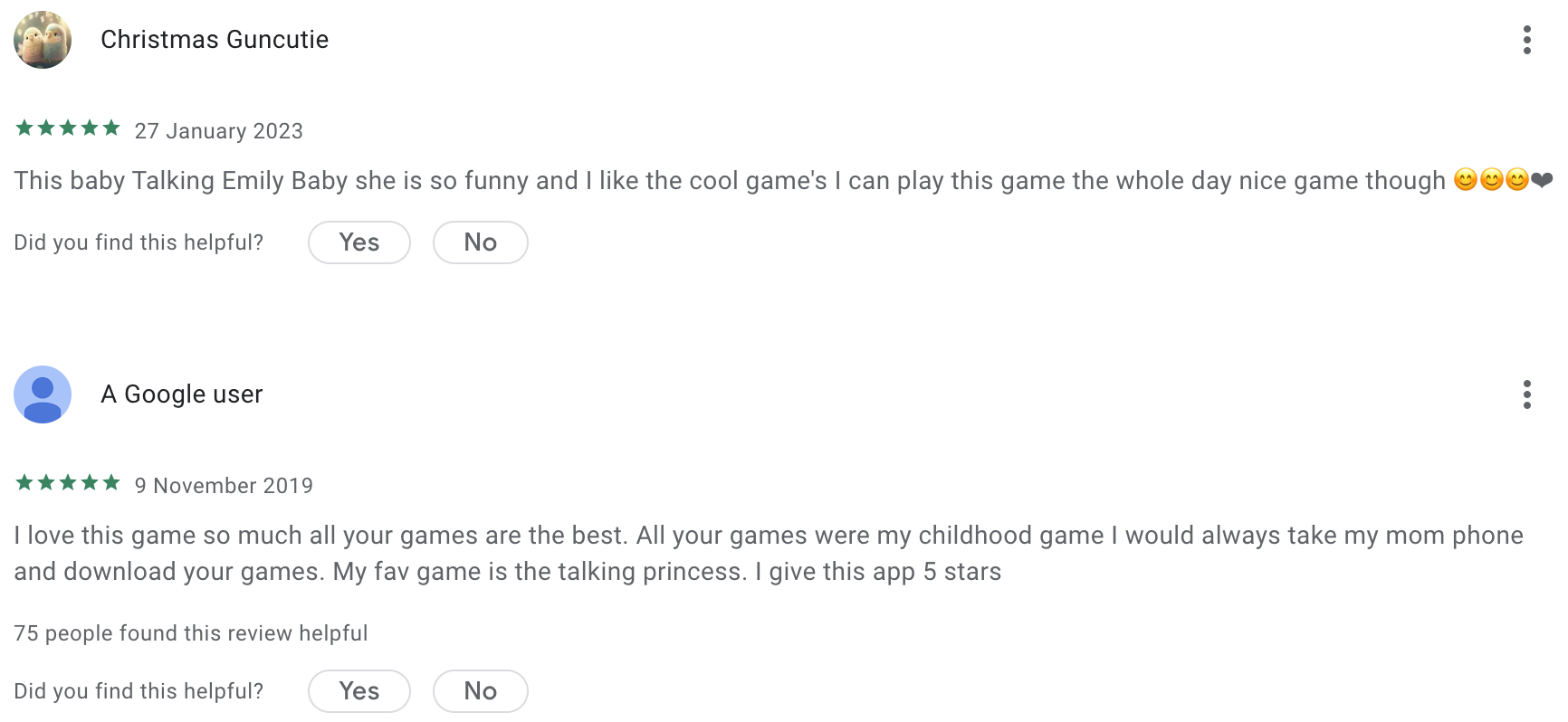
Welcome to Pixalate’s CTV & Mobile App Manual Reviews According to COPPA, a series containing the detailed factors the Trust & Safety Advisory Board educators used to assess an app’s child-directedness.
The educators manually review thousands of mobile apps available in the Google Play & Apple App Stores as well as connected TV (CTV) apps from the Roku Channel Store and Amazon Fire TV App Store using the COPPA Rule factors shown below & make those results available to the public at ratings.pixalate.com.
This post takes a look at a game from the Google Play Store. Our reviewer discusses how the subjective factors set forth in the COPPA Rule apply to the app and factor into the reviewer's determination as to whether the app is child-directed or general audience (i.e., it is not targeting children).
The teacher will indicate the factors they relied upon in their assessment using the 10 factors shown below that reflect the 10 child-directed factors in the COPPA Rule.


and
![]() and
and and
As soon as this app loads a screen asks if you want to grant permission to access your microphone while using the app. Then, you’re greeted by the app’s name sake, “Talking Emily Baby.” You can press on Emily, drop a bottle for her to drink, play drums for her to dance, and interact with her. The subject matter, visual content, and animation is clearly geared toward children wanting to interact with a baby doll. Additionally, Emily makes baby doll sounds including gooing, laughing, and even noises of passing gas. There are games along the side you can choose to play that include simple coloring pages, memory type games, and more. They are simple in nature and appear to be geared to children.
![]()
Several of the reviews indicate that it is being used by children under 13 years of age. One reviewer said, “I loved this, I used to download it before on my 3rd baby girl when she was a baby and she loved it, now she's 10 yrs old. Now I use it again for my new baby, I hope she'll also love it.” Another reviewer said, “My kids love this game a lot.”
During gameplay there were many pop-up ads that took you out of the game and into the Play Store to download the app the ad was advertising. The ads often loaded as you were moving between different games the app offered. Many of the advertisements that loaded for me were based on my location, including an ad for SkyZone, an indoor recreational place for children.
Privacy
This app’s privacy policy states that it does not knowingly collect information from users under the age of 13. When downloading the app, there was not an age gate or request that the user enter a birthday or age or accept any terms of service.
Screenshots of Talking Emily Baby:



Pixalate’s Trust and Safety Advisory Board was created to bring in individuals with experience using child-directed apps in the classroom to review and assess which apps are child-directed. This manual review process serves to quality check Pixalate’s automated review process. See our full methodology for more information.
Disclaimer
This blog post published by Pixalate is available for informational purposes only and is not considered legal advice. By viewing this blog post, the reader understands and agrees that there is no attorney-client relationship between the reader and the blog publisher. The blog should not be used as a substitute for legal advice from a licensed professional attorney in the applicable jurisdiction(s), and readers are urged to consult their own legal counsel on any specific legal questions concerning any specific situation. The content of this blog post reflects Pixalate's opinions with respect to factors that Pixalate believes may be useful to the digital media industry. Pixalate's opinions are just that, opinions, which means that they are neither facts nor guarantees; and this blog post is not intended to impugn the standing or reputation of any entity, person or app, but instead, to report findings pertaining to mobile and Connected TV (CTV) apps.
*By entering your email address and clicking Subscribe, you are agreeing to our Terms of Use and Privacy Policy.
These Stories on Mobile
*By entering your email address and clicking Subscribe, you are agreeing to our Terms of Use and Privacy Policy.

Disclaimer: The content of this page reflects Pixalate’s opinions with respect to the factors that Pixalate believes can be useful to the digital media industry. Any proprietary data shared is grounded in Pixalate’s proprietary technology and analytics, which Pixalate is continuously evaluating and updating. Any references to outside sources should not be construed as endorsements. Pixalate’s opinions are just that - opinion, not facts or guarantees.
Per the MRC, “'Fraud' is not intended to represent fraud as defined in various laws, statutes and ordinances or as conventionally used in U.S. Court or other legal proceedings, but rather a custom definition strictly for advertising measurement purposes. Also per the MRC, “‘Invalid Traffic’ is defined generally as traffic that does not meet certain ad serving quality or completeness criteria, or otherwise does not represent legitimate ad traffic that should be included in measurement counts. Among the reasons why ad traffic may be deemed invalid is it is a result of non-human traffic (spiders, bots, etc.), or activity designed to produce fraudulent traffic.”

